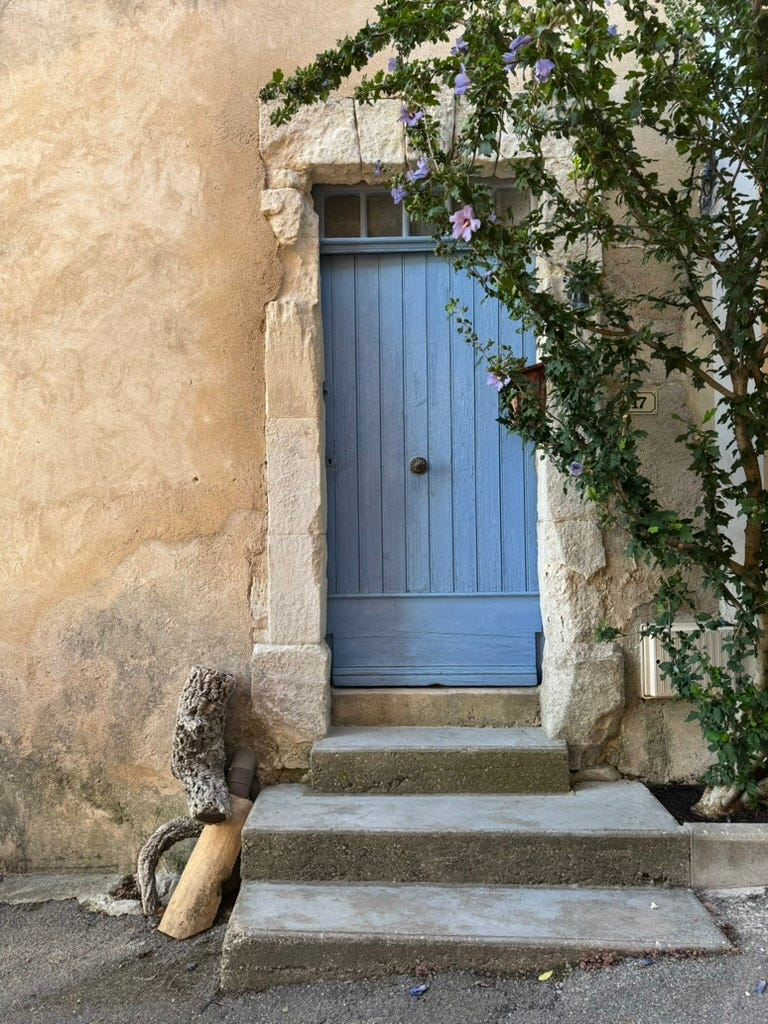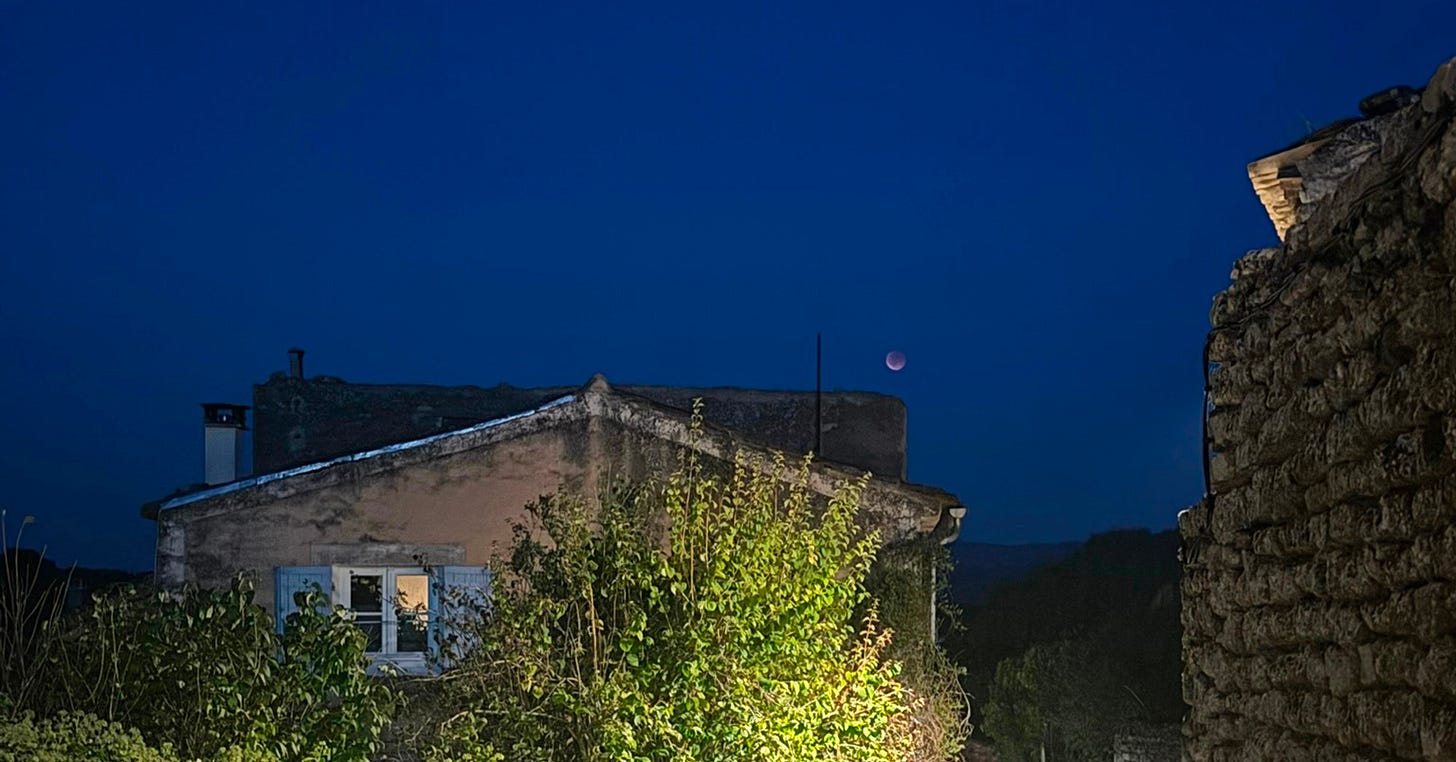The tops of the trees flash pale, pale, the palest green. I am carsick in the backseat of a Renault (rental) on a narrow road in the south of France. I have been nauseous all weekend; perhaps it is due to low blood pressure? The flu? Fall? Vertigo? Small amounts of sulfates? Stomach cancer? Pregnancy? Anxiety?
I took the Eurostar down here to visit friends for a few days and incidentally also have a (career) decision to make. I do not have all the information I need to make it (no one has the information (yet ( …. ) ) ) so it is all gut feeling at the moment. The south of France is a terrible place to try to make a decision this way because the only thing my gut is telling me is that I should move to the south of France. And take some dramamine.
The sunlight here is white, whiter than it is in the Netherlands, very direct; it turns the contrast up to a squint; turns the view out the window into a zoetrope. It is still summer, and it will be forever, Feywild, time stills, etcetera. The stonework is very beautiful. The lavender fields are very beautiful. Everything is very beautiful and seems designed, from time immemorial, to be that way.
Back in the villa, which is built from limestone and plaster, which is so nice to be in, I am reading Helen DeWitt’s The Last Samurai and apparently having the same response as Gabriel Garcia Marquez did to Kafka
When I read the line I thought to myself that I didn’t know anyone was allowed to write things like that. If I had known, I would have started writing a long time ago.
Anyways, I am pretty embarrassed by the reaction I’m having to the book, which is to love it, just like everyone else who reads it. Boy does Helen call me out. I am chugging this book, reading it as quickly as possible so that I can fully escape into imagining myself being Helen DeWitt. The main (really only) characters are Sybilia and her son Ludo. They read all day1, they learn, they remember, their genius is both easy and earned. There is distress at the edge of things; the tension is somehow peripheral to the page. I want not just what they have, but what DeWitt has had in writing this book and I am propelled into possibility and fantasy. The cadence of DeWitt’s writing has gotten in my brain and changed the pace of my thoughts. This happens to me sometimes with authors who have a very specific voice that also feels familiar enough. A bit like Arkady Martine’s imago machines. Will Helen make this decision or will I?
This summer I taught for the fourth time on the Juneau Icefield Research Program and had the delight of working with a former student who had come back as a staff member. I asked her what she was doing and she said working search and rescue at a ski resort because, she said, “Did you know you can do whatever you want?” Then she laughed self-deprecatingly. But she was actually very serious, and dedicated to knowing and doing what she wants2, and so is DeWitt, whose life and writing reminds us: it is true, you can. It will perhaps cause immense suffering but it could also generate great interest and joy and at least you will have done it. The myth goes: DeWitt herself dropped out of Oxbridge saying something along the lines of I don’t want to read Eurpides ! I want to be Euripedes !3 and perhaps that is the confidence I will carry with me into making this decision.
This was the summer of essays. Among my favorites:
Meghan Garvey’s Scary Cool Sad Goodbye 77
Skulking off into the parking lot, the wasted Swede reemerged ten minutes later in full Viking regalia—horned helmet, blonde wig, chainmail vest—blasting Metallica from his own portable speaker. But no one paid attention, enraptured by the Jamaican fellow’s sparkling performance, and within 15 minutes the Viking was asleep, helmet pressed against the bar.
Kate Wagner’s part 1 and part 2 of a series on how to write essays (I subscribed so fast to get access to these)
In general, it’s hard to gain perspective on our time while we are living in it. Even when writing in the past tense, we are more often than not still writing in a kind of present tense. To look back on the contemporary is to make use of untrodden rather than exhausted territory. There are few pastimes more fruitful than walking among the graveyard of takes. Fredric Jameson’s imperative still rings true and serves as advice in its own right: “Always historicize.”
Most of my recent book reading has been for relief and include:
Re-reading Arkady Martine’s A Memory Called Empire and A Desolation Called Peace. Here for sci-fi based on Byzantine politics that centers political poetry, though much emphasis on empire.
Read Sarah Hall’s Burntcoat in a day. Very meh. Nothing stuck. See Kate Wagner’s essay to understand why we don’t yet have any good (post-Covid) pandemic literature. This was my first book by Hall. I will probably try another.
Listened to an audio version of the Book of Emma Reyes, an epistolary autobiography by the 20th century artist. Highly recommend. I would love to read the Spanish and English side by side.
Re-read Teaching a Stone to Talk by Annie Dillard on the icefield and then gave it away. This is not her strongest essay collection but I love the imagery, sense-use, and absurdity of the depictions of ice in An Expedition to the Pole. I will get another copy when I’m back in the US.
I walk in emptiness; I hear my breath. I see my hand and compass, see the ice so wide it arcs, see the planet’s peak curving and its low atmosphere held fast on the dive. The years are passing here. I am walking, light as any handful of aurora; I am light as sails, a pile of colorless stripes; I cry “heaven and earth indistinguishable!” and the current underfoot carries me and I walk.
There were other things but they are lost to time.
Cheers, jeers, all ears,
Elizabeth
p.s. the subtitle is from Salman Rushdie’s Midnight Children. “Anything you want to be, you can be; You can be just what-all you want,” repeats Mary Pereira over and over again and you can hear the little tune it must have
or watch The Seven Samurai (of course). Sybilia also works, a bit, typing, is never bored or never expresses it. Life for her, as she presents it to us, is rational, curious, experimental, but she clearly is masking to herself and to us.
that is, she thought deeply about what she wanted, about what she liked to do, about what role she wanted to have in the world. she did not rush it and she pursued her future with intention and meaning. she’s starting as a geophysicist in the fall, or if that doesn’t work out — she’ll keep skiing
she also keeps a blog




I LOVE this Elizabeth and am now looking up subscribing and getting ready to read all the things.